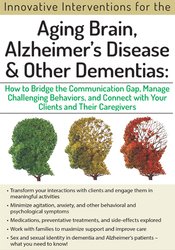

The challenges and frustrations of working with people suffering with dementia can feel overwhelming. You worry because your clients’ needs aren’t clearly communicated and you need a better way to reach them. Difficult behavioral issues like agitation and anxiety often get in the way of your ability to provide care. Interventions and techniques that worked yesterday, don’t work today. And you even need to work with patients and their spouses regarding uncomfortable personal issues like sex and sexuality that they didn’t teach you about at school.
As a Licensed Mental Health Counselor and Director of Social Work for a skilled nursing facility, Jennifer McKeown has spent the last decade immersed in the Alzheimer’s and dementia field. Through her work with hundreds of dementia sufferers and their families, she has acquired the hands-on skills, techniques, and solutions you need to handle the challenges, answer your questions, and provide the best care possible.
Join Jennifer as she walks you through what works and what doesn’t with geriatric patients facing Alzheimer’s disease and other dementias. Return to your practice better able to evaluate, assess and effectively intervene in depression, anxiety, aggression and other behavioral and psychological symptoms of dementia. Broaden your understanding of medications, preventative treatments, and the impact of their side-effects on older patients. Walk away with innovative tools to overcome communication deficiencies and a game plan for maximizing client support in partnership with caregivers and family members.
Practical and understandable, Jennifer’s animated and interactive delivery style will draw you into the dire nature of dementia and leave you feeling empowered and eager to use your new skills!
Don’t wait, sign up for this multifaceted seminar today!
Key benefits of attending:
This online program is worth 5.75 hours CPD.
| File type | File name | Number of pages | |
|---|---|---|---|
| Manual (3.42 MB) | 98 Pages | Available after Purchase |
Jennifer McKeown, LMHC, CDP, CADDCT is a Licensed Mental Health Counselor, Certified Dementia Practitioner and Alzheimer’s Disease and Dementia Care Trainer, who has seen hundreds of patients and their families through the process of dementia and Alzheimer’s disease. She found her true calling while working as a hospital social worker and a director of social work for a nursing home. Jennifer has immersed herself in the field over the last decade and serves as the director of social work for a skilled nursing facility focusing on psychosocial support and family education. Jennifer is also an adjunct professor for a community college providing professional courses on dementia to service providers as well as nursing and social work students.
Speaker Disclosures:
Financial: Jennifer McKeown is director of social work at Bethany Village. She is an adjunct professor for Corning Community College. Ms. McKeown receives a speaking honorarium from PESI, Inc. She has no relevant financial relationships with ineligible organizations.
Non-financial: Jennifer McKeown is a member of the American Mental Health Counseling Association.
| 5 |
|
| 4 |
|
| 3 |
|
| 2 |
|
| 1 |
|
Satisfaction Guarantee
Your satisfaction is our goal and our guarantee. Concerns should be addressed to info@pesi.co.uk or call 01235847393.
Please wait ...